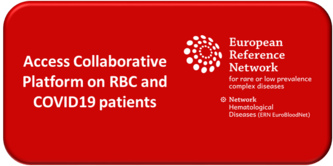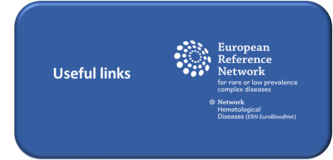ERN-EuroBloodNet Collaborative Platform on Red Blood Cell and COVID-19 patients
Collaborative Platform on Red Blood Cell and COVID-19 patients
As for the general population, the presence of co-morbidities such as diabetes, heart disease, pulmonary hypertension, reduced kidney and / or liver function, worsen the effects of the COVID-19 infection in patients affected by red blood cell disorders (RBCDs), especially sickle cell disease (SCD) and Thalassaemia patients. However, this group of patients affected by a chronic life threating disorder that become multi-organic over the time are likely to be at increased risk of complications from COVID-19. Patients at highest risk include the elderly (>50 in our population), those with a history of respiratory or cardiac disease and those with other co-morbidities.
Most of patients affected by RBCDs undergo splenectomy as therapeutic option to improve their level of haemoglobin concentration. Splenectomized patients, or in the case of SCD with functional hyposplenism, are more vulnerable to bacterial infections / superinfections after viral infection. Acute pulmonary syndrome (ACS) is the main cause of morbidity in SCD and is often triggered by infectious events.
Currently, there is no literature on the subject. Thus, any recommendation available comes from the experience gained with previous Coronaviruses infections. Accordingly, the correct treatment and management of infection by Coronavirus SARS-COV-2 (COVID-19) in patients affected by RBCDs may be challenging given the rapid spread of the pandemic and limited literature so far, especially in some countries.
ERN-EuroBloodNet has established a European collaborative platform to pool information in a collaborative way aiming to quickly identify the impact of COVID-19 on patients with red blood cell disorders and to understand the impact of risk factors such as prior disease complications.
Objectives
Primary objective of the registry is to pool evidence on the clinical management and outcomes of patients affected by red blood cell disorders and COVID-19 for supporting daily medical practice while enabling inter-professional consultation of complex cases. Secondary objective includes the performance of observational studies in the different cohorts of patients, including Sickle Cell Disease, Thalassaemia, Enzymopathies and Membranopathies patients in pediatric and or adult stages.
The network of hospitals that will be created from this registry will hold regular meetings to analyze the data that are being introduced and to discuss possible measures against COVID-19 based on them. The collaboration will continue with the development of observational studies that will give the necessary evidence to make recommendations for COVID-19 management in hematological patients.
Research protocol
Inclusion criteria include both pediatric and adults patients with confirmed COVID-19 and affected by a rare anaemia disorder due to a red blood cell defect.
Data set elements include:
- Demographics: country of living, sex, age (only year of birth)
- Data related to Red blood cell disorder: diagnosis, co-morbidities, treatments, splenectomy, blood transfusion requirement.
- Data related to COVID-19: date and method for diagnosis, severity grade, clinical manifestations i.e. pneumonia, symptoms days, acute events, treatments, days of hospitalization, days at intensive care unit, sequela, death.
The registry has been developed by Vall d'Hebron Research Institute using Redcap, a secure web application for building and managing online databases. Individual patients' data will be gathered in a codified way.
Download the Research protocol.
Legal and Ethics
The processing of personal data is conducted fully respecting the Regulation (EU) 2016/679 (General Data Protection Regulation), including legal basis and special requirements and safeguards to ensure the safety and the confidentiality of the data subjects.
The Research Ethics Committee of the Vall d'Hebron's Hospital has confirmed that this exceptional case justifies the waiver of informed consent.
Scientific Committee
Scientific Committee shall be expanded to new members providing data to the registry based on number of patients and consensus by Scientific Committee.
- Jean Benoit Arlet, MD, Internist, AP-HP - Hôpital Européen Georges-Pompidou HEGP, France
- Eduardo Jesús Bardón-Cancho, MD, Pediatric Hematologist, Hospital General Universitario Gregorio Marañón, Spain
- David Benéitez, MD, Hematologist, Principal investigator, Vall d'Hebron University Hospital, Spain
- Celeste Bento, PhD, Clinical Laboratory Geneticist, Centro Hospitalar e Universitário de Coimbra, Portugal
- Wilfried Blot, PhD, University Medical Center Freiburg, Germany
- Elena Cela, MD, Pediatric Hematologist, Hospital General Universitario Gregorio Marañón, Spain
- Jaroslav Cermak, MD, Hematologist Institute of Hematology and Blood Transfusion, Prague, Czech Republic
- Soteroula Christou, MD, Hematologist, Archbishop Makarios III, Cyprus
- Raffaella Colombatti, MD, Pediatric Hematologist, AO Padova, Italy
- Mariane de Montalembert, MD, Pediatric Hematologist, Hôpital Necker-Enfants Malades, France
- Michael Doubek, MD, Hematologist, University Hospital Brno, Czech Republic
- Kate Gardner, MD, Hematologist, Guy's and St Thomas' NHS Foundation Trust, United Kingdom
- Andreas Glenthøj, MD, Hematologist, Herlev and Gentofte Hospital, Denmark
- Béatrice Gulbis, MD, Hematologist, Hôpital ERASME-CUB, LHUB-ULB, Belgium
- Jo Howard, MD, Hematologist, Guy's and St Thomas' NHS Foundation Trust, United Kingdom
- Baba Inusa, MD, Pediatric Hematologist, Guy's and St Thomas' NHS Foundation Trust Healthcare, United Kingdom
- Antonis Kattamis, MD, Pediatric Hematologist, Aghia Dophia Childrens Hospital, Greece
- Rachel Kesse-Adu, MD, Hematologist, Guy's and St Thomas' NHS Foundation Trust, United Kingdom
- Marina Kleanthous, PhD, Molecular Geneticist, Cyprus Institute of Neurology and Genetics, Cyprus
- Joachim Kunz, MD, Pediatric Hematologist, Zentrum für Kinder- und Jugendmedizin Heidelberg, Germany
- Veerle Labarque, MD, Paediatric hematologist-oncologist, UZ Leuven, Belgium
- Stephan Lobitz, MD, Pediatric Hematologist, GKM Koblenz, Germany
- Aurelio Maggio, MD, Hematologist, AOR Villa Sofia-V. Cervello, Italy
- Giuseppe Malizia, MD, Gastroenterologist, AOR Villa Sofia-V. Cervello, Italy
- María del Mar Mañú Pereira, PhD, Researcher, Principal investigator, Vall d'Hebron Research Institute, Spain
- Corrina McMahon, MD, Pediatric Hematologist, Children's Health Ireland, Ireland
- Erfan Nur, MD, Internist-Hematologist, Amsterdam UMC, Netherlands
- Maria Pelidis, MD, Pediatric Hematologist, Guy's and St Thomas' NHS Foundation Trust, United Kingdom
- Antonio Piga, MD, Pediatric Hematologist, A.O.U San Luigi Gonzaga, Italy
- Dagmar Pospíšilova, MD, Pediatric Hematologist, Faculty Hospital of Palacky University Olomouc, Czech Republic
- Simona Raso, MD, Hematologist, AOR Villa Sofia-V. Cervello, Italy
- Alexis Rodríguez, Clinical Pharmacologist, Master in Bioethics and Law, Member of the Research Ethics Committee of the Vall d'Hebron Hospital, Spain
- Noemi Roy, MD, Hematologist, Oxford University Hospitals NHS Foundation Trust, United Kingdom
- Eduard van Beers, MD, Hematologist, University Medical Center Utrecht, The Netherlands
- Pablo Velasco Puyo, MD, Pediatric Hematologist, Principal investigator, Vall d'Hebron University Hospital, Spain
- Ersi Voskaridou-Dimoula, MD, Hematologist General Hospital of Athens "LAIKO”, Greece


